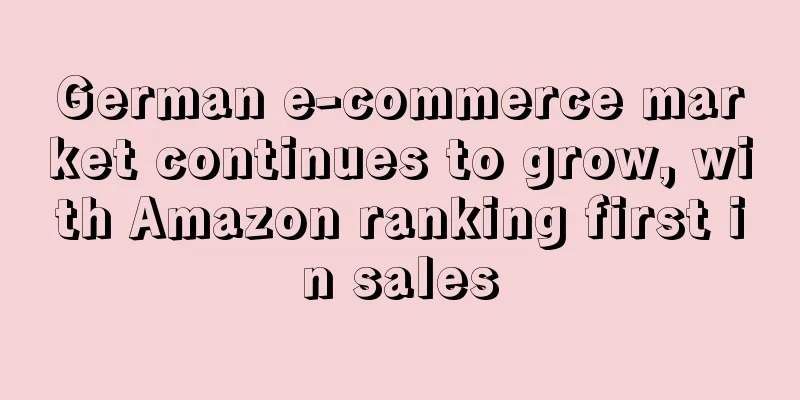Another potential market is opening up! Amazon will launch its Egypt site this year

|
Amazon announced on Monday that it will launch its Egypt site later this year.
Amazon has announced that Amazon Egypt Seller Central is now available for registration at sell.amazon.eg, where sellers can open their accounts.
Although Amazon will not launch its Egyptian site until later this year, it has been operating in Egypt since 2017 through its subsidiary Souq, a local e-commerce platform founded in 2006 and acquired by Amazon in 2017.
Sellers on the Souq platform will now also have access to Amazon Seller Central, where Amazon will verify their account information and invite them to try out new features in seller tools so they can sell on the Egyptian site immediately after launch.
Omar Elsahy, General Manager of Amazon Egypt , said: “The introduction of Seller Central in Egypt is an important milestone in our journey to continue supporting Egyptian businesses of all sizes, providing more opportunities to help them grow and connect with millions of customers.”
“Amazon already has an extensive logistics network in Egypt, and with FBA, sellers can now store their products in Amazon’s fulfillment centers for faster shipments to customers when Amazon.eg launches,” Elsahy said. “We remain committed to providing customers with an exceptional shopping experience and supporting what they value most – low prices and great selection, coupled with fast delivery.”
Although Amazon's platform allows companies to reach a wider range of customers, it is not without cost. Amazon will charge companies a referral fee of no less than 3%, and the cost will vary depending on the type of order product and the delivery channel. In addition, the storage costs of the goods must be paid.
However, if the market size or potential is huge, these costs can be borne. In 2020, the size of Egypt's e-commerce market is about 2.5 billion US dollars. Although it is small in scale, the potential of Egypt's e-commerce market is huge. At present, Egypt's population has exceeded 100 million, and the population structure is relatively young. The population over 65 years old only accounts for 3.9%, and the consumer group is huge. According to the B2C e-commerce market report in the Middle East and North Africa, it is expected that the average annual growth rate of Egypt's e-commerce consumption will exceed 30% between 2019 and 2022.
The launch of Amazon Egypt can indeed provide a convenient channel for sellers to enter a potential market like Egypt. Amazon announced on Monday that it will launch its Egypt site later this year.
Amazon has announced that Amazon Egypt Seller Central is now available for registration at sell.amazon.eg, where sellers can open their accounts.
Although Amazon will not launch its Egyptian site until later this year, it has been operating in Egypt since 2017 through its subsidiary Souq, a local e-commerce platform founded in 2006 and acquired by Amazon in 2017.
Sellers on the Souq platform will now also have access to Amazon Seller Central, where Amazon will verify their account information and invite them to try out new features in seller tools so they can sell on the Egyptian site immediately after launch.
Omar Elsahy, General Manager of Amazon Egypt , said: “The introduction of Seller Central in Egypt is an important milestone in our journey to continue supporting Egyptian businesses of all sizes, providing more opportunities to help them grow and connect with millions of customers.”
“Amazon already has an extensive logistics network in Egypt, and with FBA, sellers can now store their products in Amazon’s fulfillment centers for faster shipments to customers when Amazon.eg launches,” Elsahy said. “We remain committed to providing customers with an exceptional shopping experience and supporting what they value most – low prices and great selection, coupled with fast delivery.”
Although Amazon's platform allows companies to reach a wider range of customers, it is not without cost. Amazon will charge companies a referral fee of no less than 3%, and the cost will vary depending on the type of order product and the delivery channel. In addition, the storage costs of the goods must be paid.
However, if the market size or potential is huge, these costs can be borne. In 2020, the size of Egypt's e-commerce market is about 2.5 billion US dollars. Although it is small in scale, the potential of Egypt's e-commerce market is huge. At present, Egypt's population has exceeded 100 million, and the population structure is relatively young. The population over 65 years old only accounts for 3.9%, and the consumer group is huge. According to the B2C e-commerce market report in the Middle East and North Africa, it is expected that the average annual growth rate of Egypt's e-commerce consumption will exceed 30% between 2019 and 2022.
The launch of Amazon Egypt can indeed provide a convenient channel for sellers to enter a potential market like Egypt. Amazon announced on Monday that it will launch its Egypt site later this year.
Amazon has announced that Amazon Egypt Seller Central is now available for registration at sell.amazon.eg, where sellers can open their accounts.
Although Amazon will not launch its Egyptian site until later this year, it has been operating in Egypt since 2017 through its subsidiary Souq, a local e-commerce platform founded in 2006 and acquired by Amazon in 2017.
Sellers on the Souq platform will now also have access to Amazon Seller Central, where Amazon will verify their account information and invite them to try out new features in seller tools so they can sell on the Egyptian site immediately after launch.
Omar Elsahy, General Manager of Amazon Egypt , said: “The introduction of Seller Central in Egypt is an important milestone in our journey to continue supporting Egyptian businesses of all sizes, providing more opportunities to help them grow and connect with millions of customers.”
“Amazon already has an extensive logistics network in Egypt, and with FBA, sellers can now store their products in Amazon’s fulfillment centers for faster shipments to customers when Amazon.eg launches,” Elsahy said. “We remain committed to providing customers with an exceptional shopping experience and supporting what they value most – low prices and great selection, coupled with fast delivery.”
Although Amazon's platform allows companies to reach a wider range of customers, it is not without cost. Amazon will charge companies a referral fee of no less than 3%, and the cost will vary depending on the type of order product and the delivery channel. In addition, the storage costs of the goods must be paid.
However, if the market size or potential is huge, these costs can be borne. In 2020, the size of Egypt's e-commerce market is about 2.5 billion US dollars. Although it is small in scale, the potential of Egypt's e-commerce market is huge. At present, Egypt's population has exceeded 100 million, and the population structure is relatively young. The population over 65 years old only accounts for 3.9%, and the consumer group is huge. According to the B2C e-commerce market report in the Middle East and North Africa, it is expected that the average annual growth rate of Egypt's e-commerce consumption will exceed 30% between 2019 and 2022.
The launch of Amazon Egypt can indeed provide a convenient channel for sellers to enter a potential market like Egypt. Amazon Egypt Middle East e-commerce |
>>: Amazon's US tax cut proposal rejected
Recommend
What is Lefties? Lefties Review, Features
Lefties is a direct-sale store of Zara and other h...
What is Baoshijia
Shenzhen Beesky Technology Co., Ltd. ("Beesk...
What is Price Specter? Price Specter Review, Features
Price Spectre was developed in 2009 by eBay's ...
Kaola.com launches luxury goods subsidy for the first time, GUCCI bags are 50% off
On March 2, Kaola.com launched its first luxury g...
What is White Whale Out to Sea? White Whale Out to Sea Review, Features
BaiJing Chuhai is a comprehensive service platform...
Decorative lights are popular in Southeast Asia! High-tech and mood lights are more popular
There is still nearly half a month to Halloween, ...
Amazon is sued again for alleged advertising fraud
Amazon is being sued by a union for advertising f...
What is ePacket? ePacket Review, Features
ePacket is an economical international express se...
What is BangSeller? BangSeller Review, Features
BangSeller is a leading all-in-one tool that helps...
Anker invested 40 million yuan in Shenzhen and the smart home product sold well. It continues to be popular!
The epidemic has brought huge challenges to the m...
What is Bear Overseas Warehouse? Bear Overseas Warehouse Review, Features
Bear Overseas Warehouse was established in 2018. ...
What is VseInstrumenty? VseInstrumenty Review, Features
Founded in 2006, VseInstrumenty is Russia's l...
Having served nearly 60,000 customers, Polish DTC furniture brand Tylko has raised nearly 170 million yuan
Tylko , a digital furniture company headquartered...
Embracing multiple skin colors, Amazon and other platforms sell racially diverse bandages
Recently, some major retailers, such as Amazon, T...
Sales close to 930 billion won! Korean men's demand for luxury goods expands
Recently, there has been a high demand for luxury...









